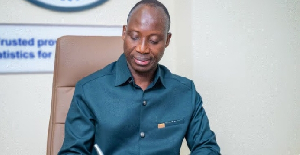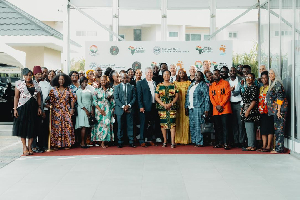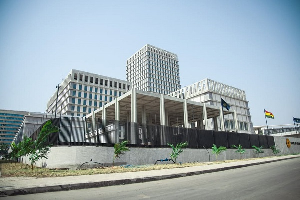Politics, they say is a game, and like every other game, it has its rules aimed at encouraging fairness, and it also has some tricks often played by participants who intend to cheat in the game be it soccer, politics or whatever game. Like soccer, the behavior of the referee can very well determines who wins and who looses independent of how well either team plays in a match.
Politicians are like match officials and how well they do determine the level of happiness in the country where they are elected, selected or imposed to govern. How well politicians in Ghana play this game of politics determines the level of development and the nature of freedom and wellbeing of Ghanaians as compared to Togolese all other things being equal. So I keep asking this question of my friends; what has the political establishment in Ghana or better still what have politicians consistently done wrong to prevent economic development from taking place in Ghana? As someone once told me, if Ghana is still poor after 48 years of independence, then our policy makers must bear all the blame, and the guilt of nonperformance must be hanged around their necks. I do not think that politicians alone are the cause of our woes as I have sought to demonstrate in the previous articles, however, since they have the power to affect our choices and decisions, I believe they bear the greater responsibility in moving the nation forward in development. So any failure to develop must be their failure. What then have politicians done to prevent growth in Ghana? I intend to explore some few wrong policy choices and behavioral patterns of politicians in Ghana that are inimical to Economic growth in Ghana.
The first on the list to talk about is the lack of policy continuation after change in government: I do not believe that the frequency of change in government in itself is the problem inhibiting development in Ghana. After all, we have had 8 governments since independence. It is 48 years since we had our independence, 48 divided by 8 governments, gives an average of 6 years per government which is far greater than an average of 4 years under most democratic governments in the west. Also, I do not believe that the military?s role in politics has been the reason d?etre for our lack of growth as some have been touting. What governments have done whilst in power, I believe, has been and continue to be the real problem. With perhaps the possible exception of the Kuffour?s government, successive governments whether civilian or military had either abandoned the programs of their predecessors and initiated completely new programs and policies of their own or had significantly deviated from the focus of the predecessor government?s programs or implement them haphazardly.
This trend of political and economic discontinuity always bring the nation back to square one, because whilst new resources are found to start new programs of their own, programs already started with enormous resources are left in half way to fail so that the previous government could take no credit for the success of such programs. A classical example is what happened after the overthrow of Nkrumah in 1966. Almost all projects that were in progress were abandoned, silos were not completed, and agricultural machineries were abandoned to rot. Schools that were uncompleted were left that way, and etc. whiles growing up in my town (name withheld), I saw numerous brand new combine harvesters, plows, planters, graders, and many earth moving machines parked in what was then called state farm yard for years until they were rotten. The projects had been abandoned after the fall of Nkrumah and the machines were not even sold to the private firms for their use. Nkrumah was gone so everything he was doing must go, seemed to have been the attitude at the time but the question is who lost? Nkrumah or Ghana? Similarly, Busia started opening up the rural sector by extending telephones to certain towns and villages from the districts capitals and guess what happened, after his overthrow, the project was starved of financing, the system started deteriorating, and eventually phone services outside the district capitals were all abrogated, then bandits started stealing the phone wires since they were no longer working, the poles were cut and used as firewood and eventually back to square one.
The lack of continuity in the implementation of programs often sets the country back so many years and a lot of resources are wasted in that way. Remember that China?s Mao was one of the worst human rights abusers that the world has ever known, yet upon his death, China did not throw overboard his political programs and policies, they were reformed to suit the changing China, and now, upon the mention of china?s name, shivering waves are sent down the spines of U.S policy makers. South Africa of course never attempted to reverse every policy and program of the apartheid era; they are gradually reforming them to reflect the new South Africa.
A second major problem has been policy makers? inability to appraise their programs for quick and effective overhaul. I do not know whether it is a kind of syndrome or something else, that even if we noticed in Ghana that something is not working, it becomes so difficult to change it. I simply cannot understand this. We all know that the kind of education provided to us under colonialism was meant to provide the kind of education which could at best make us suitable for work in Europe and at worst, make us subservient to our Masters for their exploitation of our resources, however, after independence, it took us so many years to even start reforming the content of that education and until now, we have not done all the necessary reforms to make education suitable to our needs. As a developing nation, we spend a lot of money to train people as archeologists even though we have no need for more than ten (10) archeologists in the whole nation. Every politician knows that science holds the future of all nations but in Ghana, nobody is making policies towards that effect. Look at the defunct Ghana Airways, it incurred losses every year since its establishment in early 1960s yet we continued to finance it until last year when donors forced the hell out of our politicians to do the right thing. We could mention the former STC, GNTC etc.
Another major reason for our failure to develop has been the confusion of politicians in charting a political course suitable for Ghana. After colonization, we seem to have experimented with all sorts of political philosophies under the sun. Nkrumah tried socialism, Afrifa and Kotoka?s government blended capitalism with socialism, and in an apparent attempt to break completely from the past, Busia experimented with pure capitalism; Acheampong was a socialist and later nationalist and experimented with union government. Rawlings came to power as a full socialist but was later forced by the western donors to adopt capitalist policies amidst confusion. Limann?s government had socialism as their philosophy and now Kuffour is now experimenting with liberal capitalism. All these political experiments meant that the technocrats and the bureaucrats who are at the various government departments charged with the implementation of policies were left confused as politicians kept shifting gears back and forth. This also affected the development of solid institutions with defining philosophies important for nation building. People were fired from the ministries because they did not share the ideology of the new government. Businesses were intentionally killed by governments because their owners did not support the government of the day and etc
Failure to pay agriculture the needed attention had also affected our growth prospects. Ghana is an agricultural nation, since over 60% of its labor force is in agriculture. If agriculture was developed and income in the sector rose, that would have meant an income rise for over 60% of the working people which could have positively triggered growth. Instead, we saw an attempt to develop manufacturing industries that imported everything that went into production, sometimes including labor. Such firms and corporations were protected as infant industries that needed protection from established competitors. The irony is that, the industries never grew up, and they remained protected until they collapsed leading to waste of precious resources and distortion of the economy because their loses were financed year after year by government with our taxes whiles managements of such enterprises enjoyed good fortunes. Examples were the State transport corporation, Ghana Airways, the jute factory and many more.
Financial repression is yet another reason for the country?s failure to make any meaningful inroads into the development process in Ghana. Until recently, interest rate and the exchange rates were fixed and controlled by the government with serious consequences for the economy. Whilst the pegging of the foreign exchange rate encouraged black marketeering and led to shortage of hard currencies needed by industry to import raw materials and spare parts to enhance production as we all witnessed in the 1970s and 1980s, the fixed low interest rate combined with the high levels of inflation meant that savers lost big time with any savings. In fact, there was negative real interest rate regime during those periods of controlled lower interest rates. Savings were actually dissipated and capital formation dwindled to near zero, starving the economy of much needed investment capital for growth.
Of course, another major problem was, and still is corruption in official places, which I intend to devote ample time to analyze in future articles.















